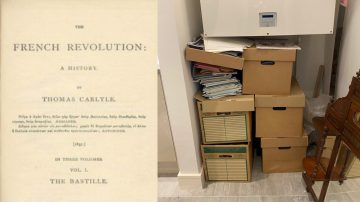So, have you booked your holiday yet?
It’s a tricky decision to make, that’s for sure. Do you want to get on a plane in a mask? Will the rules change and you’ll be stranded abroad? If you book in the UK will the weather stay fine? And has the donkey on the beach been spritzed with disinfectant? It’s so stressful. You’ll need another holiday the moment you get back from the first one.
This summer we are all discombobulated by the unfamiliar structure of our current routine. The concept of leisure and rest as a counterpoint to our professional lives is blurred by our near-constant presence at home and limited incursions beyond strange new social bubbles.
The word ‘holiday’ of course, derives from ‘holy-day’ and dates back to the Middle Ages when a trip to Church rather than the beach was the requisite activity if you were given any time off work. Chaucer, for example, was on Spring Break when he popped over to Canterbury on a pilgrimage, as ordinary people felt compelled to take a bit of me-time to praise the lord for surviving harsh winters. It was meant to be a sombre affair, but ‘The Canterbury Tales’ is actually a boozy story-telling contest in a tavern, which must have been the fun part of the trip, rather than the subsequent visit to the shrine of St Thomas Becket.
In Tudor England, all twelve days of Christmas were work-free holidays. The first day after Twelfth Night was known as ‘Plough Monday’ suggesting a return to hard graft on the land. Nowadays, we go back to our offices (remember them) overweight and alcohol-pickled to stare morosely at our computer screens and decide which gym to join, whilst scanning cheap holiday deals for August. Until its sad demise last year, that holiday search might have been courtesy of Thomas Cook. Its 178 years history reflects the evolution of our holiday needs.
Thomas Cook himself was no party animal. Born in Derbyshire in 1808, he was a man of religious conviction who, in 1841, began dabbling in transport plans for his fellow followers of the temperance (abstinence from alcohol) movement. The first trip was a thrilling rail journey from Leicester to Loughborough, but operations quickly expanded beyond local trains. (Perhaps if he had launched 11 years earlier, the business would have been called Club 1830?) A tour to Liverpool four years on was booked by 1,200 people. It was so popular that Cook had to repeat it for 800 further customers, a fortnight later. In 1868, he produced the first ever holiday brochure and a year later, he literally pushed the boat out and hired two steamers for a trip up the Nile.
In 1919, the company marketed with an ad in The Times, the first pleasure flight in a converted Handley First World War bomber. (Health and Safety was a bit more lax in those days.) 1945 saw the business nationalised in the spirit of post war collectivism and it became part of the railways. By 1950, a million Brits were holidaying abroad. The company identified that women were increasingly becoming the decision makers and it’s 1963 brochure was cunningly disguised as a women’s magazine called ‘Holidaymaking’.
1992 saw the business in German ownership and it operated a three-tiered strategy catering for different segments – from mass to luxury. Finally, in 2003, its own airline took-off. How far it had come from 1865 when Thomas Cook opened his first office in Fleet Street, London with a temperance hotel above it to remind people that sobriety and travel were indistinguishable. By the time of its collapse, you could sit by the sea sipping sangria sensuously (as they say in the brochure) all day long. Limitless holiday options free us from the mundane constraints of the everyday
Which brings us circuitously to our current travel dilemmas. How should we switch off from a world that is constantly bombarding us with bad news whilst simultaneously destroying our corporate and commercial future? On my first day of work as a graduate, I was given a piece of advice that I subsequently passed on to anyone that would listen. “Always take every day of your holiday entitlement. Do not say you are too busy.” Not exactly profound, but an important reminder to maintain some perspective.
Different cultures have markedly different approaches to how much time we should take off for holiday. The USA has traditionally the stingiest approach to vacation, on average between 10-15 days, plus 11 public holidays. According to Wikipedia, the lucky people of Andorra, Burkino Faso and Cambodia get a total of 45. It is more fluid in Europe, but try getting any work done in France, Spain or Italy in the month of August.
Arguably, the concept of a holiday is harder to manage when you consider that our normal hours and place of work are unlikely to be the same for some time to come. Add the tyranny of constant accessibility into the mix and one might reflect that the original religious definition of a holy day that is kept separate is not such a bad idea. ‘Please don’t Zoom me, I am trying to have a quiet pray.’
Whatever you choose to do this summer, think again how to detach from the new volatile working demands you face. Days off should mean imposing self-discipline in either switching off or delegating. A holiday now does not require travel, but more than ever it requires physical distance from to-do lists. This is not a new discussion. But since lockdown in March, we have managed to prove our tenacity in working differently and effectively. There is no excuse therefore for trying to find new ways to rest and recuperate. Holidays should be spiritually nourishing wherever and however they are taken.
I haven’t quite worked out my plans for the summer yet. At the moment I am toying between a cheese making course in Tuscany, learning to watercolour in The Dordogne or a week in Butlins Bognor Regis. It depends on who has got the best hand-sanitiser.



